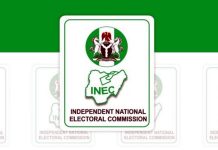The Presidency, Friday, May said it has received the passed 2018 Appropriation Bill of N9,120,334,988,225 for the 2018 fiscal year which is now awaiting President Muhammadu Buhari’s assent.
President Muhammadu Buhari (right), welcome Senate President Bukola Saraki during the meeting between President Buhari and the Leadership of the National Assembly at the State House, Presidential Villa Abuja . Photo by Abayomi Adeshida
In a statement Friday night, the Senior Special Assistant to the President on National Assembly Matters (Senate), Senator Ita Enang, acknowledged receipt of the 2018 Appropriations bill passed by the National Assembly.
Ita Enang who disclosed that he has received the 2018 budget passed by both chambers of the house and is set to be transmitted to President Muhammadu Buhari, said: “I have received the 2018 appropriations bill for onward transmission to the President as soon as possible.
“Since the appropriations bills has received, what is left is for it to be transmitted immediately to the President.”
It will be recalled that the National Assembly, had last week, Wednesday passed the 2018 Appropriation Bill of N9,120,334,988,225 for the 2018 fiscal year, representing an increase of N508 billion from the N8.612 trillion proposal presented to the joint National Assembly by President Muhammadu Buhari late last year.
The Appropriation Bill was read the third time and passed, waiting to be transmitted to the President for assent.
Presenting the details of the 2018 Appropriation Bill for consideration at the Senate during Chairman of the Senate committee on Approrpiations, Senator Danjuma Goje, APC, Gombe Central explained that the 6% increase of the budget estimates from N 8.612 trillion to N9.120 trillion was done in consultation with the executive arm of government.
The 2018 Appropriation Bill, the largest in the nation’s history, is premised on key revenue assumptions of oil price benchmark of $51; crude oil production of 2.3 million barrels per day and exchange rate of N305/$1USD.
President Buhari’s proposal had projected an oil price benchmark at $45, crude oil production at 2.3mbpd and based on an exchange rate of =N=305 to $1, and the Senate confirmed that seven issues critical to the nation’s development were responsible for the increase of the budget figure.
Senator Danjuma Goje while presenting the committee’s report on the 2018 Appropraitions Bill before the Senate said,” In processing the 2018 Appropraitons Bill, the Committee premised expenditure on the following key assumptions: Oil price benchmark- USD$51; Crude Oil Production- 2.3mbp/d; Exchange rate- N305/USD
“The 2018 proposals had projected an oil price benchmark as USD$45, Crude oil production at 2.3mbp and based on an exchange rate of N305 to 1 USD.”
“The Highlights of the 2018 Appropraition Bill. The 2018 Appropriation Bill as worked on, contains the following highlights: Aggregate Expenditure for the 2018 Appropraition Bill – N9, 120,334,988,225; Statutory Transfers –N530,421,368,624; Debt Service –N2,203,835,365,699; Recurrent Expenditure –N3,512,677,902,077; Capital Expenditure-N2,873,400,351,825; Fiscal Deficit-N1,954,464,993,775. Deficit to GDP-1.73 per cent.”
Senator Goje also listed the critical sectors where the increase was applied to include; “Reduction of deficit N50.88 billion; Security N46.72billion; Health N57.15billion; Power, Works and Housing N106.50billion; Education (particularly for the infrastructure for the 12 newly established Universities and meal subsidy in Unity schools) N15.70billion; Judiciary N10.00billion and Niger Delta Development Commission (NDDC) =N=44.20billion, which is a part payment of the NDDC liabilities on the Federal Government of Nigeria.”
According to him, this was attributed to the increase in oil price benchmark. To this end, the lawmaker said the proposal was jerked up from $45 per barrel to $51 per barrel. Highlights of the budget are “=N=530,421,368,624 for Statutory Transfer; =N=2,203,835,365,699 for Debt Service; =N=3,512,677,902,077 for Recurrent Expenditure, =N=2,873,400,351,825 for Capital Expenditure, Fiscal Deficit of =N=1,954,464,993,775 and 1.73% Deficit to GDP.”
In the passed budget, projects such as power, works and housing as well as Transportation got the highest capital allocation out of total sum of N2.873 trillion in the 2018 budget.
The breakdown shows that Federal Ministry of Power, Works and Housing got the highest allocation of N682.309 billion, followed by Transportation to that tune of N251.420 billion; N157.715 billion for Defence; N149.198 billion for Agriculture and Rural Development; N147.200 billion for Water Resources and N102.907 billion for Education while N150 billion was alloted for capital Special Intervention programme.
Breakdown of the 2018 budget also showed that National Assembly got N139.5 billion as against N125 billion in 2017; National Judicial Council (NJC) gets N110 billion as against the sum of N100 billion approved by President Muhammadu Buhari.
Part payment to NDDC outstanding liabilities on Federal Government gets N33.98 billion while NNDC gets N81.883 billion; Universal Basic Education gets N109.064 billion; Independent National Electoral Commission gets N45.5 billion; National Human Rights Commission gets N3.014 billion while Public Complaint Commission gets N7.48 billion.
Out of total sum of N2.014 trillion allotted to debt serving, the sum of N1.760 trillion is for domestic debts while N254.080 billion is for Foreign debts and additional sum of N190 billion is for sinking fund to retire matured loans.
From the total sum of N3.513 trillion approved for recurrent (non-debt) expenditure, Federal Ministry of Interior gets the highest allocation of N501.610 billion, followed by N439.256 billion for education; N419 billion for Defence; N269.965 billion for Health; N110.842 billion for Youth and Sports Development; N76.025 billion for office of the National Security Adviser; N63.535 billion for Petroleum Resources and N63.114 billion for Foreign Affairs.













